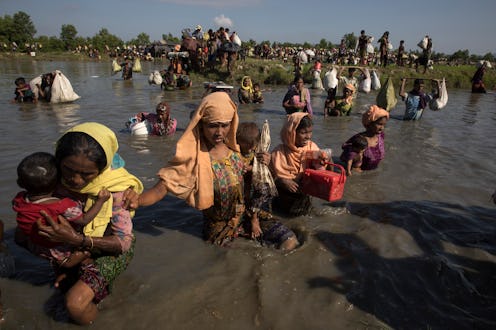News
Rohingya Women Say The Military Is Now Rounding Up & “Mass Raping” Refugees

Government security forces in Myanmar are systematically raping Rohingya women, according to a report released by the Human Rights Watch on Thursday. The account shows that the military's perpetration of sexual violence is even more widespread than previous reporting indicated.
The organization interviewed 52 female Rohingya refugees in Bangladeshi camps. More than two dozen of them — 29 — were rape survivors, all but one of whom had been gang-raped. The investigation found evidence of sexual assault and rape that had occurred not only during the military's violent campaigns on Rohingya villages, but also in the weeks leading up to these attacks.
All of the alleged assailants were uniformed personnel. In some cases, women and girls were raped and then killed. Human Rights Watch said it found six instances of "mass rape," in which soldiers gathered females into groups before raping them.
Survivors reportedly fled to Bangladesh before receiving any post-rape health treatment and were often forced to walk with their injuries for days. Some of the interviewees "continued to experience physical injuries, including vaginal tears, bleeding, or infections as a result of rape, without accessing care," the report states. "Many of the women we spoke to reported symptoms of post-traumatic stress disorder (PTSD) or depression."
The organization says that many hundreds of rape cases have been reported in Bangladesh refugee camps and that these "likely only represent a proportion" of the attacks.
Many activists are calling the recent wave of massacres against Rohingyas "genocide." In September, Zeid Ra’ad al-Hussein of the U.N. Human Rights Council said, "The situation seems a textbook example of ethnic cleansing."
"Rape is an act and a weapon of genocide," United Nations diplomat Pramila Patten said this month after a visit to Rohingya refugee camps. "The widespread threat and use of sexual violence was a driver and 'push factor' for forced displacement on a massive scale, and a calculated tool of terror aimed at the extermination and removal of the Rohingya as a group."
Rohingyas are a Muslim minority in Buddhist-majority Myanmar, formerly known as Burma. Most Rohingyas live in Rakhine, a state along Myanmar's western coast, where they are subjected to periodic violence from both soldiers and civilians. Rohingyas are not considered citizens and are denied access to basic government services. In the words of The Guardian, they are "the world’s most persecuted people."
The repression of the Rohingya people goes back decades. More recently, riots and clashes with Buddhists in Rakhine left about 140,000 displaced in 2012. Additional violence caused 200,000 to be displaced by 2015. Since late August, when the latest round of violence began, over 600,000 more Rohingyas have fled into Bangladesh.
This latest conflict started Aug. 25 when a group of Rohingya militants attacked government soldiers. Security forces have been attacking Rohingya villages since then, allegedly to conduct counter-insurgency, but with a "clearly disproportionate" response, according to the U.N. They have been massacring civilians, destroying homes, forcing communities to flee, and committing the systematic sexual abuse described by Human Rights Watch.
Aung Sun Suu Ki — leader of the pro-democracy movement in Myanmar, de facto leader of the country, and winner of a Nobel Peace Prize — has received widespread criticism for failing to take adequate action to stop the Rohingya massacres. She is reportedly against the idea of declaring a state of emergency in Rakhine. When she visited the state earlier this month and met with Rohingya leaders, she "only said three things to the people — they should live peacefully, the government is there to help them, and they should not quarrel among each other," Chris Lewa of the Arakan Project told The Guardian.
"I don’t know why people say that I’ve been silent. I haven’t been silent," Suu Kyi told reporters during a press conference with Secretary of State Rex Tillerson on Wednesday. "We cannot make the kind of statements that drive them further apart. This is the reason why we are very careful about what is said."
Some supporters of Suu Kyi argue that she cannot take more action to stop the massacres because her control over the military is limited.
To help the Rohingya people, consider donating to organizations like the United Nations High Commission for Refugees and Save the Children.